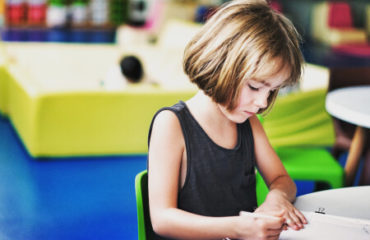
Moving from Year 6 to Year 7 is a huge shift in your child’s life. Not only will their expectations change academically, but moving into high school is also a big shift socially. In many cases, your child will have to adjust to a new school; potentially one in which none of their previous peers are attending. This means a new environment, new friends, new teachers and an overall new routine. Here are our top tips to help make the transition between primary and secondary school that bit easier:
1. Attend Orientation Events
Most schools will offer orientation days where you and you child can visit the school and gain an understanding of how the school runs. During these days, you’ll have the opportunity to meet the principal and various teachers. Orientation days are a great first-step for your child, allowing them to become somewhat familiar with the school grounds and the teaching staff before they begin their first day.
2. Find out if anyone else is attending the same school
Particularly if you are enrolling your child into a local school, ask around to see if anyone else is also sending their children there. It will always be more comfortable for your child if they know someone who will also be at the school. This won’t work for every child, but if there is someone they currently go to school with, or a friend in the local neighborhood, make sure your child knows so that they can seek this person out on the first day.
3. Understand the School routine
While most schools operate during fairly regular hours, some schools may have differing timetables or class schedules. Make sure you understand the school routine so that you can help your child schedule their days.
4. Be Prepared
Begin preparations for the first day at school early. Make sure your child has everything they need including their uniform, school bag, books, and equipment.
5. Understand Travel Arrangements
It’s possible that your child will need to make their own way to and from school, either by walking or catching public transport. In either case, make sure you physically travel the route with them prior to school starting. Ensure they are comfortable with the travel arrangements, know the travel times (eg. bus, train or tram timetables) and are confident that they can get to and from school without any hassles.
6. Stay in the Loop
As children move into secondary school, their social lives do change, as does the way you interact with them. They’ll probably no longer be asking for assistance with school work, and their schedules may soon be taken up with “hanging out” with friends. Remember to always keep an open communication with them in regards to their school work. If they look like they are struggling at all, seek help immediately. The curriculum at secondary school moves a lot faster than that in primary school, so try to ensure they are keeping up every step of the way.
7. Peers
Your child’s peers can have a huge influence on how they behave, both inside and outside of school hours. While you can’t insist on your child being or not being friends with certain people, try to instill a strong work ethic and good morals in your child, and encourage them to befriend others who have the same outlook. Hanging around children who are disruptive can cause the most gifted child to fall down the ranks.
8. Have an Emergency Plan
In the event that something goes wrong, make sure your child knows what to do. This could be as simple as providing them a mobile phone with your home, mobile and work numbers saved in favourites. This gives your child confidence that if something does go wrong, they know what to do.
9. Prepare academically in Year 6
With secondary school introducing new distractions and social events, it’s important that your child is prepared well before beginning Year 7. We find that children who are even a little ahead academically going into their first day of secondary school have more confidence and achieve better results than those who are academically just at their year level. If you are aware of your child being behind at all, or struggling with any specific concepts through primary school, make sure you seek help immediately. If you can work to get your child a little ahead moving into secondary school, you can rest a little easier knowing they won’t fall behind if they lose concentration from time-to-time during classes.
10. Be Positive
Finally, just be positive! Make sure you see your child entering secondary school as a positive step, and they’re sure to look forward to it too. You can make all the difference between your child looking forward to the change or feeling anxious about it, so make sure all conversations about their new high school life are positive.
Lynn’s Learning tutors students from Kinder to Year 10. So whether you are looking to prepare your child for high school early, or are needing some assistance during their secondary school years, you can contact us for a discussion about your child’s performance and how we can help. We cater for children of all abilities, from those struggling at school to children requiring extension beyond their year level. Contact us today for a chat about how we can help your child realise their academic potential!



